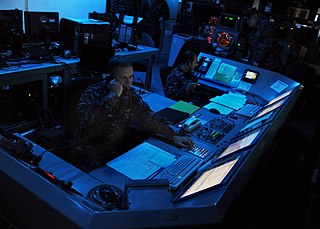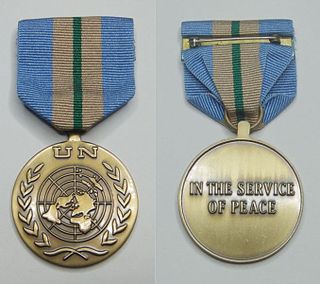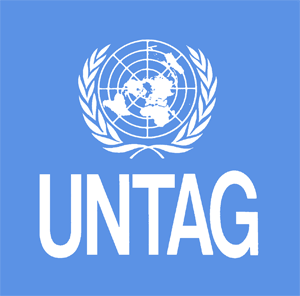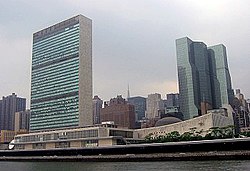
Peacekeeping comprises activities, especially military ones, intended to create conditions that favor lasting peace. Research generally finds that peacekeeping reduces civilian and battlefield deaths, as well as reduces the risk of renewed warfare.

The United Nations Organization Stabilization Mission in the Democratic Republic of the Congo or MONUSCO, an acronym based on its French name Mission de l'Organisation des Nations Unies pour la stabilisation en République démocratique du Congo, is a United Nations peacekeeping force in the Democratic Republic of the Congo (DRC) which was established by the United Nations Security Council in resolutions 1279 (1999) and 1291 (2000) to monitor the peace process of the Second Congo War, though much of its focus subsequently turned to the Ituri conflict, the Kivu conflict and the Dongo conflict. The mission was known as the United Nations Mission in the Democratic Republic of Congo or MONUC, an acronym of its French name Mission de l'Organisation des Nations Unies en République démocratique du Congo, until 2010.

Military operations other than war (MOOTW) are military operations that do not involve warfare, combat, or the threat or use of violence. They generally include peacekeeping, peacebuilding, disaster response, humanitarian aid, military engineering, law enforcement, arms control, deterrence, and multilateralism.

A United Nations Medal is an international decoration awarded by the United Nations (UN) to the various world countries members for participation in joint international military and police operations such as peacekeeping, humanitarian efforts, and disaster relief. The medal is ranked in militaries and police forces as a service medal. The United Nations awarded its first medal during the Korean War (1950–1953). Since 1955, many additional United Nations medals have been created and awarded for participation in various United Nations missions and actions around the world.
Canada was a founding member of the United Nations, and was an original signatory of the Declaration by United Nations. At the signing of the Declaration by United Nations, Canada was one of four Dominions of the British Empire present, alongside Australia, New Zealand, and the Union of South Africa. In 1945, Canada was present at the United Nations Conference on International Organization and signed the Charter of the United Nations. McGill University professor John Peters Humphrey was the principal author of the first draft of the Universal Declaration of Human Rights.

The United Nations Operation in Côte d'Ivoire (UNOCI) was a UN-NATO peacekeeping mission in Ivory Coast whose objective was "to facilitate the implementation by the Ivorian parties of the peace agreement signed by them in January 2003". The two main Ivorian parties were the Ivorian Government forces who controlled the south of the country, and the New Forces, who controlled the north. The UNOCI mission aimed to control a "zone of confidence" across the centre of the country separating the two parties. The Head of Mission and Special Representative of the Secretary-General was Aïchatou Mindaoudou Souleymane from Niger. She succeeded Bert Koenders from the Netherlands in 2013, who himself succeeded Choi Young-jin from South Korea in 2011. The mission officially ended on 30 June 2017.
The Iceland Crisis Response Unit is an Icelandic para-military unit with a capacity roster of up to 200 people, of whom about 30 are active at any given time. It is operated by the Icelandic Ministry of Foreign Affairs. It is primarily designated for peacekeeping operations and was established in the 1990s to participate in operations and peacekeeping projects, including in support of NATO peacekeeping operations. That role later evolved into providing an appropriate forum for deploying personnel within other organizations such as with OSCE field missions as well as with UN DPKO, and organizations such as UNIFEM, UNRWA and UNICEF.

The Department of Peace Operations (DPO) is a department of the United Nations charged with the planning, preparation, management and direction of UN peacekeeping operations. Previously known as the Department of Peacekeeping Operations (DPKO), it was created in March 1992, as part of a restructuring of the UN's peace and security apparatus. The DPO retains the core functions and responsibilities of its predecessor, with a greater emphasis on cohesion, integrating different resources and knowledge, and promoting human rights.

The United Nations Integrated Mission in East Timor (UNMIT) was established on 25 August 2006 by UN Security Council Resolution 1704. Its objectives are "to support the Government in consolidating stability, enhancing a culture of democratic governance, and facilitating political dialogue among Timorese stakeholders, in their efforts to bring about a process of national reconciliation and to foster social cohesion". In its most recent resolution on UNMIT, the Council extended its mandate until 26 February 2012. UNMIT and ISF troops left the country at the end of 2012.
The United Nations Peacekeeping efforts began in 1948. Its first activity was in the Middle East to observe and maintain the ceasefire during the 1948 Arab–Israeli War. Since then, United Nations peacekeepers have taken part in a total of 72 missions around the globe, 12 of which continue today. The peacekeeping force as a whole received the Nobel Peace Prize in 1988.

The African Union-United Nations Hybrid Operation in Darfur was a joint African Union (AU) and United Nations (UN) peacekeeping mission formally approved by United Nations Security Council Resolution 1769 on 31 July 2007, to bring stability to the war-torn Darfur region of Sudan while peace talks on a final settlement continue.

The Bangladesh Armed Forces and the Bangladesh Police have been actively involved in a number of United Nations Peace Support Operations (UNPSO) since 1988. Currently Bangladesh is the largest contributor in the UN peacekeeping missions.

Walter Dorn is a Canadian military historian and defence specialist. Dorn teaches military officers and civilian students at the Canadian Forces College (CFC) in Toronto and also at the Royal Military College of Canada (RMC) in Kingston. He lectures and leads seminars on the ethics of armed force, peace operations, the United Nations, arms control, Canadian and US foreign/defence policy, Canadian government and society, and science/technology applications. He serves as chair of the Department of Security and International Affairs at CFC and previously was chair of the Master of Defence Studies programme at RMC.

The 1999 East Timorese crisis began with attacks by pro-Indonesia militia groups on civilians, and expanded to general violence throughout the country, centred in the capital Dili. The violence intensified after a majority of eligible East Timorese voters voted for independence from Indonesia. Some 1,400 civilians are believed to have died. A UN-authorized force (INTERFET) consisting mainly of Australian Defence Force personnel was deployed to East Timor to establish and maintain peace.

Australian military involvement in peacekeeping operations has been diverse, and included participation in both United Nations sponsored missions, as well as those as part of ad hoc coalitions. Indeed, Australians have been involved in more conflicts as peacekeepers than as belligerents; however, according to Peter Londey "in comparative international terms, Australia has only been a moderately energetic peacekeeper." Although Australia has had peacekeepers in the field continuously for 60 years – the first occasion being in Indonesia in 1947, when Australians were among the first group of UN military observers – its commitments have generally been limited, consisting of small numbers of high-level and technical support troops or observers and police. David Horner has noted that the pattern changed with the deployment of 600 engineers to Namibia in 1989–90 as the Australian contribution to UNTAG. From the mid-1990s, Australia has been involved in a series of high-profile operations, deploying significantly large units of combat troops in support of a number of missions including those in Cambodia, Rwanda, Somalia and later in East Timor. Australia has been involved in close to 100 separate missions, involving more than 30,000 personnel and 11 Australians have died during these operations.

The Australian Services Contingent was the Australian Army contribution to the United Nations Transition Assistance Group (UNTAG) peacekeeping mission to Namibia in 1989 and 1990. Australia sent two contingents of over 300 engineers each to assist the Special Representative of the Secretary General, Martti Ahtisaari, in overseeing free and fair elections in Namibia for a Constituent Assembly in what was the largest deployment of Australian troops since the Vietnam War.

Canada has served in over 50 peacekeeping missions, including every United Nations (UN) peacekeeping effort from its inception until 1989. More than 125,000 Canadians have served in international peacekeeping operations, with approximately 130 Canadians having died during these operations. Canada's strong support for multilateralism and internationalism has been closely related to its peacekeeping efforts.

Foreign relations exist between Australia and Solomon Islands. Australia has a High Commission in Honiara and Solomon Islands has a High Commission in Canberra. The two countries are members of the Pacific Islands Forum.

The United Nations Mission in the Central African Republic, more commonly known as MINURCA was a United Nations peacekeeping force in the Central African Republic. The 1350-troop mission was established by the United Nations Security Council Resolution 1159 in March 1998. It was replaced in 2000 after the Central African Republic conducted two peaceful elections, with the entirely civilian composed UN Peace-Building Support Office in the Central African Republic (BONUCA).

The Australian Peacekeeping Memorial, located at the southern end of Anzac Parade in Canberra, Australian Capital Territory, commemorates the service and sacrifice of all Australians who have served on peacekeeping or peacemaking missions around the world. It was inaugurated on 14 September 2017 by the Governor-General of Australia, General Sir Peter Cosgrove AK MC. The Memorial is a living memorial that commemorates the service of all Australian peacekeepers- past, present and into the future.
















